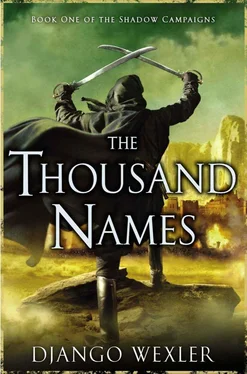Django Wexler - The Thousand Names
Здесь есть возможность читать онлайн «Django Wexler - The Thousand Names» весь текст электронной книги совершенно бесплатно (целиком полную версию без сокращений). В некоторых случаях можно слушать аудио, скачать через торрент в формате fb2 и присутствует краткое содержание. Жанр: Фэнтези, на английском языке. Описание произведения, (предисловие) а так же отзывы посетителей доступны на портале библиотеки ЛибКат.
- Название:The Thousand Names
- Автор:
- Жанр:
- Год:неизвестен
- ISBN:нет данных
- Рейтинг книги:4 / 5. Голосов: 1
-
Избранное:Добавить в избранное
- Отзывы:
-
Ваша оценка:
- 80
- 1
- 2
- 3
- 4
- 5
The Thousand Names: краткое содержание, описание и аннотация
Предлагаем к чтению аннотацию, описание, краткое содержание или предисловие (зависит от того, что написал сам автор книги «The Thousand Names»). Если вы не нашли необходимую информацию о книге — напишите в комментариях, мы постараемся отыскать её.
The Thousand Names — читать онлайн бесплатно полную книгу (весь текст) целиком
Ниже представлен текст книги, разбитый по страницам. Система сохранения места последней прочитанной страницы, позволяет с удобством читать онлайн бесплатно книгу «The Thousand Names», без необходимости каждый раз заново искать на чём Вы остановились. Поставьте закладку, и сможете в любой момент перейти на страницу, на которой закончили чтение.
Интервал:
Закладка:
In the interim, Marcus sent three companies down to the riverbank. The Auxiliaries who’d taken shelter there were in no state to fight, many having abandoned their weapons or gotten their powder wet in the river crossing. They surrendered after a desultory skirmish, and Marcus had another half company of prisoners to add to the hundred or so that were already in his bag. The enemy had lost twice that many killed and wounded, he judged, and he doubted if his own losses numbered a dozen.
“They’re not so tough,” Adrecht said, reflecting the general mood in the camp. Night had fallen, and campfires were sprouting throughout the village and outside the tents beyond the hill. “If they keep this up, we won’t have to trouble the colonel after all.”
“If they keep this up, they’re not as clever as we’ve given them credit for,” Marcus said. They were still at his vantage point at the front of the temple, from which he could see the whole triangular village, the ford, and a good bit of the country beyond. “They tried to brush past us and got their hand slapped. I doubt they’ll try it again.”
“What else can they do, though?” Adrecht said. “The ford’s not wide enough to send two battalions at once, and if they come one by one they’ll just get chewed up the same way.”
Marcus shook his head. He was watching more campfires spring to life, like ground stars, on the opposite bank of the river. There were an awful lot of them.
“We’ll find out,” he said.
• • •
They found out the next morning.
The Auxiliary gunners didn’t even wait for dawn. As soon as enough gray light had filtered into the sky to outline their targets, the north bank of the river blazed into horrible life, muzzle flashes cutting through the semidarkness. They were followed a moment later by the low, flat booms of the reports echoing across the water, and the drone and crash of incoming roundshot.
The ford was a particularly wide spot in the river, which meant the range had to be at least six or seven hundred yards. Too far to pick out individual men, even if the guns had been capable of such accuracy. The enemy gunners didn’t even try. Instead, they went to work on the houses closest to the riverbank, bowling their cannonballs in long arcs that descended screaming into the Colonials’ carefully prepared positions. The first few shots were off, either flying wide into the town or splashing in the shallows, but the Khandarai gunners quickly found the range. The clay walls of the village shacks provided no protection at all-worse than nothing, in fact, since the clay had a tendency to splinter and fill the interior of a hut with razor-sharp shards when a cannonball punched through.
Within half an hour, all the houses along the waterfront were piles of broken rubble, and fires had started in a dozen places. That didn’t concern Marcus overmuch-there wasn’t enough wind to drive a real blaze-but he watched the eastern horizon impatiently. The sun seemed to rise with interminable slowness, the world gradually lightening until it was possible to see the enemy positions. Rising clouds of powder smoke marked each gun. There were four of them directly opposite the ford, arrayed in a neat line right out of the artillery textbook.
“Right,” he said to his artillerists, who had been standing by with similar impatience. “Go to it.”
The Colonial guns took up the challenge with a roar. During the night Marcus had split them into three divisions, spread out along the riverbank; one directly opposite the ford, for canister work if the Auxiliaries tried a rush, while the other two provided enfilading fire from farther up the bank. Now all six twelve-pounders went to work, probing through the smoke for the enemy cannon.
It was a little like watching a handball match, Marcus reflected. The assembled soldiers of either side had nothing to do but watch and cheer for their own team, as the gunners sweated and struggled with balls, powder bags, and rammers. There was a cheer, audible even on the temple hill, whenever one of their own guns placed a shot near enough to fountain dirt and smoke over the enemy gunners.
Marcus had ordered that the caissons-the big carts that the guns hitched to when marching, which carried the ammunition reserves-be kept well back from the actual firing sites. This meant an inconveniently long haul whenever stores of powder and shot ran low, but he organized details from the infantry to run the supplies up to the front in relays. The men went to it with a will. He suspected that doing anything to contribute, however little, felt better than crouching behind broken walls and flinching at the sound of every cannonball.
Under the fire of the Colonials, the Auxiliaries’ guns adjusted their aim and tried to reply, but it was an unequal contest. Not only did the Colonials have more pieces, but they were dug in behind barricades of dirt and rubble that shielded the gunners from any but direct hits, while the Auxiliaries were out in the open. The smoke made it impossible to see what effect the duel was having, but it seemed to Marcus that the replies from the enemy pieces were starting to slacken.
That the enemy had not matched his precaution with their caissons became obvious when a fountain of fire blossomed through the fog bank on the opposite shore, lifting and spreading like a great orange flower. A moment later an enormous boom , like a single monstrous footstep, drowned out even the sound of the cannon. When the flames faded away, leaving behind a huge mushroom-shaped cloud, the Auxiliaries’ guns had stopped firing. The Colonials kept shooting for a few more minutes, then came to a ragged halt. Cheers rose from the waterfront and around the temple.
Lieutenant Archer, the Preacher’s second-in-command, arrived at Marcus’ impromptu headquarters along with the first of the wounded. With the bombardment halted, details were finally able to get through to the waterfront and start pulling away the rubble. Team after team hurried by with stretchers or improvised travois made from doors, boards, or whatever else was at hand. Other teams, moving more slowly, carried the dead.
Archer himself was unharmed, though the powder blackening his face showed that the young lieutenant had been intimately involved in the artillery duel. He saluted smartly.
“Any losses?” Marcus said. His eyes were still fixed on the other bank, where the smoke was gradually drifting away.
“Two men,” Archer said. “One dead, God rest him. The other may live, but he’ll lose the arm. One gun’s limber damaged. Otherwise, nothing serious. By the grace of the Lord,” he added piously. Archer was the Preacher’s right-hand man, and shared his spiritual zeal.
“Good,” Marcus said. “If that’s the best they’ve got, they’re not crossing anytime soon.”
“Beg pardon, sir, but that can’t be the best they’ve got. Those were Gesthemel eight-pounders. They’ve got to be older than I am.”
“That’s what the Auxies have to work with. For the most part we gave them Royal Army castoffs.” Marcus hesitated. “I’m surprised you got such a good look at them.”
“I didn’t, sir. But you can tell by the report, if you know what you’re listening for.”
“I’ll take your word for it,” Marcus said dryly.
“Yessir. But if they were planning on defending the crossing at Westbridge, they must have had more than a few light guns to do it with. My guess is they’re still bringing up the heavier pieces.”
“Someone over there is in a hell of a hurry,” Marcus said. He hoped that was a good thing. If they wanted to cross so badly, stopping them should be worth something, shouldn’t it? He grimaced as another stretcher team went past. “If you can’t keep them suppressed, we’re going to have an awful time on the riverbank.”
Читать дальшеИнтервал:
Закладка:
Похожие книги на «The Thousand Names»
Представляем Вашему вниманию похожие книги на «The Thousand Names» списком для выбора. Мы отобрали схожую по названию и смыслу литературу в надежде предоставить читателям больше вариантов отыскать новые, интересные, ещё непрочитанные произведения.
Обсуждение, отзывы о книге «The Thousand Names» и просто собственные мнения читателей. Оставьте ваши комментарии, напишите, что Вы думаете о произведении, его смысле или главных героях. Укажите что конкретно понравилось, а что нет, и почему Вы так считаете.











